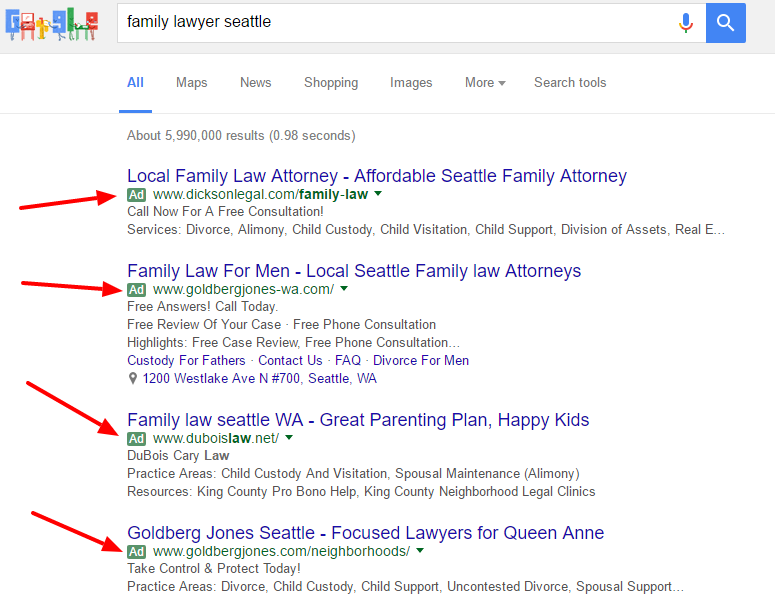PPC is an acroymn defined as Pay Per Click. It usually refers to any form of online advertising where the advertiser is charged each time a user clicks on one of their ads. This is not to be confused with SEO, which is the process by which a website is optimized to naturally appear higher in search rankings (learn more about SEO here). There are many different PPC platforms available to advertisers today, with Google Adwords and Facebook being among the most popular. Going forward we will discuss some of the basics of PPC advertising.
PPC Marketing On The Google Search Network

When a user performs a search on Google, they will most likely see PPC ads as the first four search results, identified by the small green ‘ad’ label (see above example). When a user clicks one of these links, they will be directed to that advertisers website, and the advertiser will be charged a fee for that click.
How Much Does PPC Marketing Cost?
The cost per click can vary wildly depending on the industry you are targeting. In some industries it could be as low as $0.25 per click, and in others (like legal services, or insurance for example) it could be $25 per click or higher. Generally, the more expensive or profitable the end service, the higher cost per click will be.
It should be noted however, the the advertiser will always be in complete control of the cost per click, and overall budget. When running a PPC Campaign, you can choose a maximum amount you are willing to spend per click, and also set a daily maximum budget.
How Does PPC Work?
It’s easiest to explain how PPC works through explaining how a campaign is created. First, we will select keywords that we feel are important for our company to show ads on, for example “family lawyer seattle”. Then, we will write some advertisements following Google’s guidelines, that describe our company and the services we offer. Now we will decide how much we are willing to spend per click. This is important as it will be one of the main determining factors to where your ad will appear on the page. Once we’ve set the maximum cost per click, our ad will begin to show when people search for our keyword, and we will be charged when they click the link and visit our website.
Now this example is as simple as can be, when in fact there are many more variables that occur in an Adwords PPC Campaign. It’s important to understand keyword research, keyword modifiers, bidding strategies, location & device bidding, search impression share, click through rates, conversion rates, quality score and much more to properly run a profitable PPC campaign. It should then come as no surprise that while it’s possible to learn how to run Adwords yourself, many small business owners outsource and hire a PPC management company to oversee and run their PPC marketing campaigns.
Benefits of PPC Advertising
One of the main benefits of PPC advertising is the ability to clearly track your return on investment. In Google Adwords, every penny you spend is tracked, and attributed back to the user’s search query so you can know exactly what keywords are driving new business. Compare that to traditional TV, radio, or newspaper ads where it is very difficult to calculate how successful the ad campaign has been.
Another main benefit from PPC advertising is the data that you gain while running a campaign. Not only will you learn what keywords your customers are typing into Google to find you, but you’ll learn the time of day they visit your website, their geographical location, what device they use to access your website, and much more. All of this is valuable business intelligence that can be used to further optimize your campaigns, and your online strategy as a whole.
User intent is another key benefit of Google Adwords which helps to separate it from other types of advertising. Instead of putting your product or service in front of users while they are watching a TV show, or listening to the radio (when they otherwise aren’t interested in your brand), Google ads appear when users are actively searching and are interested in finding you. In 2016 it is far more important for potential customers to find you online when they need your product or service, rather than your brand being forced on them during a commercial break.
Facebook Advertising

Facebook allows advertisers to show different types of ads to their users. In the above example, we see a sponsored newsfeed story, as well as a right column ad. Unlike Google Adwords, users will see your ads based on the targeting settings you have specified during the campaign creation.
How Does Facebook Targeting Work?
Facebook has powerful targeting features to allow advertisers to show their ads to their target market. For example, let’s say you are selling clothes for young women. With Facebook, you could easily set your ads to only be shown to Women aged 16-22, living in Los Angeles, New York, and Miami, who are fans of Britney Spears and/or Miley Cyrus. Through combining age, gender, location, and interests you can clearly define your target audiences.
How Much Does Facebook PPC Marketing Cost?
Like Google Adwords, the costs will vary depending on your targeting settings. Generally however, a click on Facebook is cheaper than a click on Adwords. Many brands use Facebook for large scale branding campaigns for this reason.
We hope this post has helped you to better understand PPC Marketing and how it could help your business. Have any questions? Please contact us or ask in the comments below!

